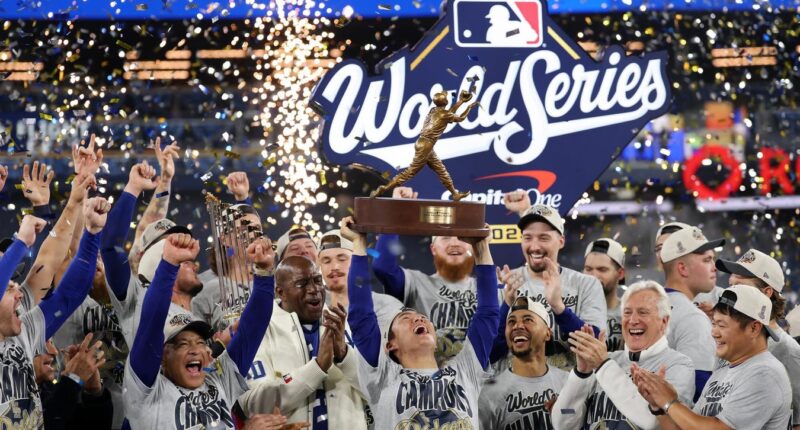Share this @internewscast.com
On August 8th, the Toronto Blue Jays arrived in Los Angeles only to suffer a 5-1 defeat at the hands of the Dodgers. The following night, the Dodgers dominated again with a 9-1 victory. However, on Sunday afternoon at Chavez Ravine, Toronto initially took a 1-0 lead thanks to a Vladimir Guerrero Jr. double in the first inning. The Dodgers quickly responded when Shohei Ohtani hit a leadoff homer, and soon after, Freddie Freeman smashed a ball over the left-center fence, putting Los Angeles ahead 2-1.
The Dodgers added another run in the second inning, but Toronto narrowed the gap in the sixth. In the eighth, Guerrero and Addison Barger hit consecutive home runs, edging the Blue Jays ahead 4-3. Yet, when Jeff Hoffman walked Freeman with the bases loaded in the bottom of the eighth, the game was knotted at four.
In the ninth inning, Ernie Clement launched a home run off Alex Vesia, handing Toronto the lead once more. Hoffman then walked three batters in the bottom of the ninth, setting the scene for Ohtani to bat with bases loaded and only one out, trailing by a single run. Blue Jays’ Manager John Schneider turned to the bullpen, bringing in rookie left-hander Mason Fluharty for his 45th career appearance. With a 5.23 ERA, Fluharty faced the daunting task of pitching to the three-time MVP, soon to be four-time. After a full count and two foul balls, Fluharty managed to get Ohtani to swing and miss a sweeper in the dirt, marking the second out.
The challenge was not over for Fluharty, as former MVP Mookie Betts stepped up to the plate. Unfortunately for Los Angeles fans, Betts hit a gentle grounder to third, ending the threat, the inning, and the game. The Dodgers then traveled to Anaheim, while the Blue Jays headed home, with little thought given to what seemed like an uneventful Sunday game in August.
Fast forward two months, and when the World Series matchup was announced, it was clear that Fluharty’s pivotal strikeout of Ohtani and Betts’ groundout, along with the Dodgers’ inability to secure a sweep in that August series, had significant implications. The Dodgers ended their season with a 93-69 record, while the Blue Jays finished slightly ahead at 94-68. This record granted Toronto home-field advantage in the World Series, which, as history records, extended to a full seven games.
In a previous piece, I discussed the financial benefits the Blue Jays gained by hosting two additional Championship Series games and two additional World Series games. For the Dodgers, their loss on that August Sunday meant missing out on the chance to host one extra World Series game. The question remains: what financial impact did that missed opportunity have on them?
Last week I wrote about the additional revenue gleaned by the Blue Jays for hosting two additional Championship Series games and two additional World Series games. Well, as a result of their loss that Sunday in August, the Dodgers lost the opportunity to host one additional World Series game. What did that cost them?
Over the three World Series games that they hosted, Los Angeles averaged 52,460 fans (Dodger Stadium is the largest ballpark in MLB). Using the same metrics utilized in the analysis of Toronto’s largesse, assume the Dodgers “comp” 5% of their tickets for VIPs and the like. That means the team lost out on just under 50,000 additional paying customers. With average ticket prices coming in at approximately $400, that is slightly under $20 million. Also, assuming about $40 per person on concessions, that is just under another $2 million. Nearly $22 million was lost because the Dodgers could not push across those two runs that warm Sunday afternoon.
But wait, there is more. Because practically everyone in Los Angeles drives to the game, the Dodgers open up their almost 20,000 parking spaces for the playoffs. And this year, they charged $70-$90 per car. If you take the average ($80), and you account for 90% capacity (at least of paying customers), that’s another $1.44 million. However, because Dodgers former owner, Frank McCourt, still has a 50% interest in the parking lots, cut that number in half, and what you get is a rookie’s salary lost (about $720,000).
The rich don’t always get richer. The Dodgers lost a game in August to a visiting team from the American League East, and, as a result, lost nearly $23 million in potential additional revenue from a fourth World Series game. Of course, no one reading this will shed a single tear for a team with a $350 million payroll, back-to-back World Series titles, and a Forbes valuation of $6.9 billion. But it is interesting nonethless.











